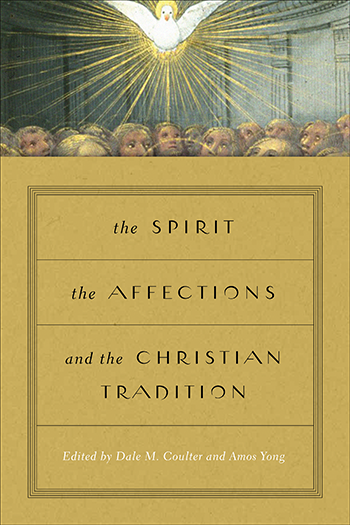The Spirit, the Affections, and the Christian Tradition
 Dale M. Coulter and Amos Yong, eds., The Spirit, the Affections, and the Christian Tradition (Notre Dame, IN: Notre Dame University Press, 2016).
Dale M. Coulter and Amos Yong, eds., The Spirit, the Affections, and the Christian Tradition (Notre Dame, IN: Notre Dame University Press, 2016).
The Spirit, the Affections, and the Christian Tradition is a collection of essays concerning the role and understanding of emotion throughout the history of Christian thought. These essays were contributed by academics representing a variety of disciplines, including historians, philosophers, and biblical scholars. Each chapter focuses upon a different historical era or historical figure, ranging from the first century with Saint Paul to Jonathan Edwards in the eighteenth century. Space limitations prevent me from summarize all twelve chapters, but some other notable figures of focus include Augustine, John Chrysostom, Thomas Aquinas, Martin Luther, John Wesley, and Blaise Pascal. Each essay not only provides new insights concerning these persons of faith, particularly their theology regarding the affections, but the authors also project trajectories for future work.
Part of the volume’s goal is to contribute to renewal historiography. According to Coulter, this type of historiography “underscores the methodological import of sensitivity or orientation to the charismatic dimension of Christian existence that informs the critical reading and interpretation of texts and ideas” (1-2). Coulter points out that some of the contributors do not typically operate from this background, nonetheless their work herein contributes to renewal historiography in important ways. It is an ecumenical venture that “facilitates a sensitivity to the charismatic and ecstatic as well as the pneumatological dimensions of Christian tradition” (23). Thus, for the Church universal, these essays attempt to provide a more holistic approach to history. Amos Yong’s final chapter offers an insightful analysis of the volume’s implications. Here, he argues that a renewal perspective can illuminate areas of history that have been neglected or marginalized heretofore. He argues, “any adequate understanding of the Spirit cannot be reduced to the intellectual register” (300). For him, historical and theological investigations that do not probe the heart, or the emotions, fail to explore the work of the Spirit.
In recent years, academia has begun to recover the role and value of the emotions, and this book fills a lacuna concerning the affections in Christian thought. Obviously, the contributors were only able to examine a sample of historical views, but the depth of the insights gained here is promising. It points toward the possibility of other insights being retrieved. Along these lines, however, feminine perspectives deserve greater attention. Elizabeth A Dreyer’s chapter on emotion in the Middle Ages addresses women, such as Hadwwijch of Brrabant, Teresa of Avila, and Catherine of Sienna, but overall, I would like to see the voices of women be given a more prominent role. In sum, these essays were written with a scholarly audience in mind, so it requires some academic vigor. Although the text is principally concerned with historical views, it presents applications for the contemporary context. Readers may find it provocative and challenging, if not transformative. I found the book to be a worthwhile and fulfilling read.
Reviewed by David Bradnick
Publisher’s page: http://undpress.nd.edu/books/P03251
Preview The Spirit, the Affections, and the Christian Tradition: https://books.google.com/books?id=IlUFDgAAQBAJ
Category: In Depth, Summer 2017


